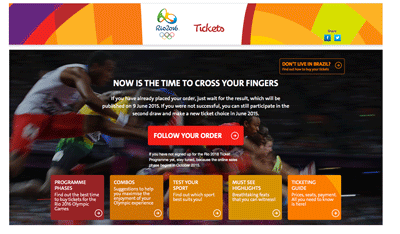The Rio 2016 Organizing Committee is launching the largest ticket consignment program for an Olympic Games yet, hoping to provide unprecedented liquidity to systems criticized in the past as being arcane or even unfair to local consumers.
Any of the roughly 5 million tickets designated for the Brazilian market for the 2016 Games will be eligible to be bought and sold through the Games’ official website from October to moments before the particular ticketed event, according to the group’s ticketing director, Donovan Ferreti. Tickets will be resold only at face value, and the organizing committee will return the full proceeds of the sale to the seller, Ferreti said.
 |
The Games’ official website will feature resale of tickets, only at face value.
|
“We decided to charge the same price because we want to avoid the black market,” he said. “We want the tickets in the hands of the real fans.”
Prior Games have had featured resale platforms of their own, but those were of limited use. For instance, in London in 2012, resales were limited to strictly defined time periods and required paper printouts of digital tickets.
In Rio, returned tickets will be sold on the same website (www.rio2016.com/tickets) as all other tickets. The system is designed to operate in real time, Ferreti said, and organizers and German partner CTS Eventim are hoping to deploy a fully paperless system once the Games start.
The resale system’s launch in October coincides with the third and final phase of ticket sales for the 2016 Games: the direct-to-consumer, first-come-first-served period.
Most of the 5 million Brazilian-only tickets will have already been distributed during two lotteries this summer for which customers had to register earlier this year. (The remaining 2.5 million tickets are designated for other countries, sponsors or international Olympic officials.) Supply outpaced demand in those lotteries, but the ticket lotteries sometimes end with buyers being assigned tickets they don’t want or do not fit their schedules.
But last-second American shoppers armed with a strong dollar shouldn’t expect to benefit from the ticket liquidity in Brazil. Rio 2016 organizers and CTS Eventim plan to control access to the site by requiring a Brazilian national ID number and a Brazilian-issued credit card for purchases.
In 2012, foreign visitors found easy ways around rules that had been established for the London Games’ system, for which you needed only to provide a local address. A hotel address worked, for instance.
“You make the process harder to be broken, but of course nothing’s perfect,” Ferreti said. “Maybe you have a friend here, I don’t know — but yes, we are trying to really guarantee that 70 percent of the tickets are offered to Brazilian citizens or residents.”
Building the back end of the consignment operation is complicated technically, but the front end is meant to be fully integrated into the general ticketing system, Ferreti said.
Ticket resellers, both official and unofficial, have proliferated in the United States for more than a decade, but details of Olympic distribution rules and strict anti-scalping laws in Brazil have kept flexible secondary markets from developing. As recently as the 2014 FIFA World Cup, sellers were subjected to a 30 percent fee for returning their tickets, Ferreti said.
Local attendance has been a hot-button issue at some Games, as the International Olympic Committee and local organizers balance corporate interests, a need for full seating on television broadcasts, and local demand. In London, newspapers complained about premium seats sitting empty while the general public struggled to get tickets.
Don Dow, an executive sports hospitality consultant, said the London ticket resale operation had limited inventory and required him to pick up tickets at a box office. The nominal restriction to local residents didn’t seem to apply at all once the Games were underway. “At the end of the day, they wanted to sell that ticket,” he said.





